Merediths of Montgomery County Arkansas
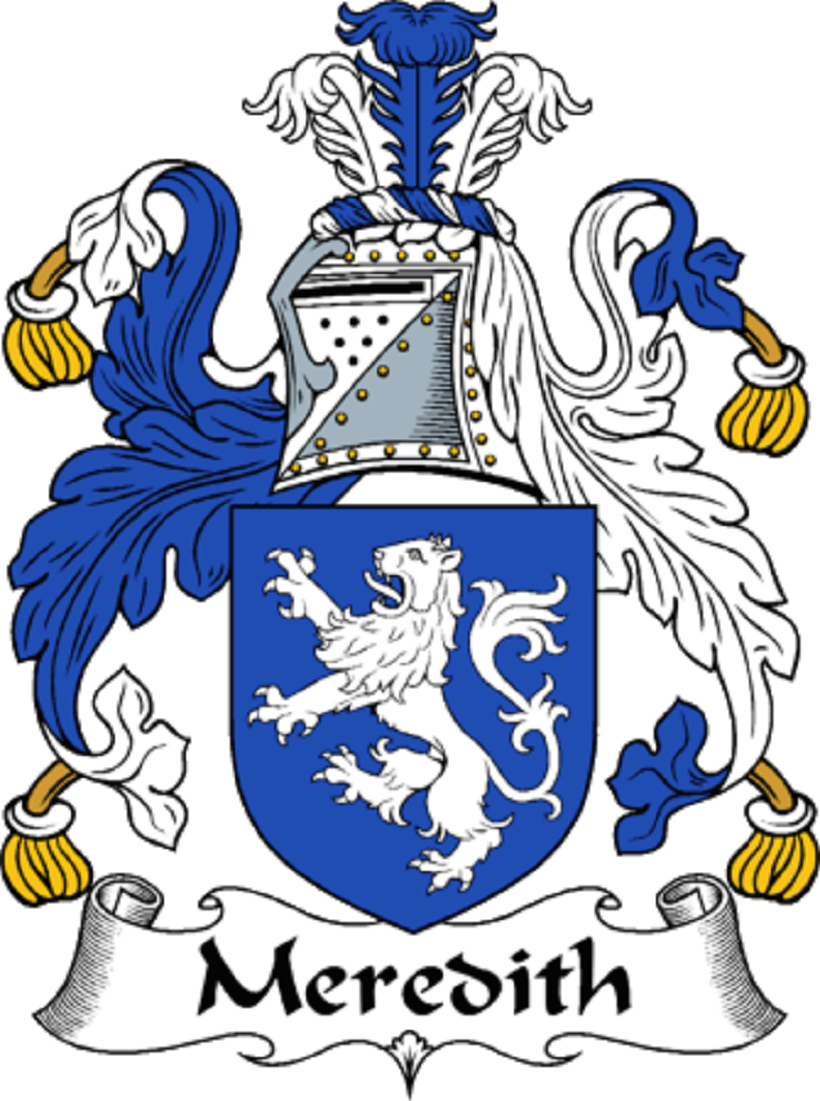
As was covered in the Scott page, we have two Meredith lines in our family tree. Frank
Scott, the first of the line born in Arkansas, wed Mary Elizabeth Meredith. Then a few
decades later, Frank's son Grover wed Myrtle "Sally" Meredith, after his first wife
died young. So, Meredith enters my tree through both a great-great-grandmother and
great-grandmother. It's obvious they had to be cousins, two women of the same maiden
name in the same Arkansas rural area. I'm updating this analysis with new information
as with the rest of my family tree, but this one has a significant restructuring of the
actual tree. Thankfully it's been simplified from the dual-narrative I had before. I
will soon explain what caused the previous confusion. Meredith is a Welsh surname, so
we'll end up there at the time that surnames were adopted.
William and Mary
In the first phase of this story, we'll begin with individual people in the line, going
backward from my great-grandmother, for all of them that I know the names of. The second
phase will cover what can be determined from the surname and where it departed for America,
and the Y-DNA which tells a tale that goes all the way back, not just through written
history, but to the very beginnings of humanity. The final phase will cover the rest of
the family tree of William T Meredith, my great-great-grandfather, and Mary E Meredith, my
great-great-grandmother, through all of their great-great grandparents. Keep in mind that
most of them lived their lives before the Revolution, and information for the most part
becomes sketchy. I've had to rely on DNA to even identify our relation to many of them.
Myrtle Meredith was the second wife of Grover Scott, and mother of my grandfather. She
was born 1894 in Mena Arkansas, which is nearby to Montgomery County. Myrtle's father
was William T Meredith, born 1853 in Gap, Montgomery County. William's father was
Duncan Meredith, born 1829 in Carroll County Georgia. Mary E Meredith was Frank Scott's
wife, and Grover Scott's mother. Mary was born 1853 in Montgomery County. Her father
was William Meredith, born 1827 in Carroll County Georgia. Duncan's father was John born
1806, and the elder William's father was John born 1806. Aside from the repeated name
William, this should seem simple: Duncan and the elder William were brothers, and William
T and Mary E were first cousins.
It actually was that simple. Instead of complicating this document with the long
investigative process I went through to correct my previous mistake, let's just get
right to what confused me. The elder William was enumerated twice in the 1850 census of
Montgomery County. There was a William who was Duncan's brother. And there was a
William born 1827 who was head of his own household. I guess this happened because
William was at his parents' house when they were enumerated, and he didn't think to
point out that he had his own family and was enumerated there. Maybe his wife gave info
for him, and he didn't realize there could be a problem for future descendants doing
genealogy. I took that mistake as proof that Duncan and William his brother were both
bachelors in 1850, and the other William had to be the son of another John. But let's
just forget about all that. Even though Grover Scott's mother was Myrtle's aunt, he
married Myrtle anyway. It was an emergency situation, Grover losing his first wife and
having very young children to care for.
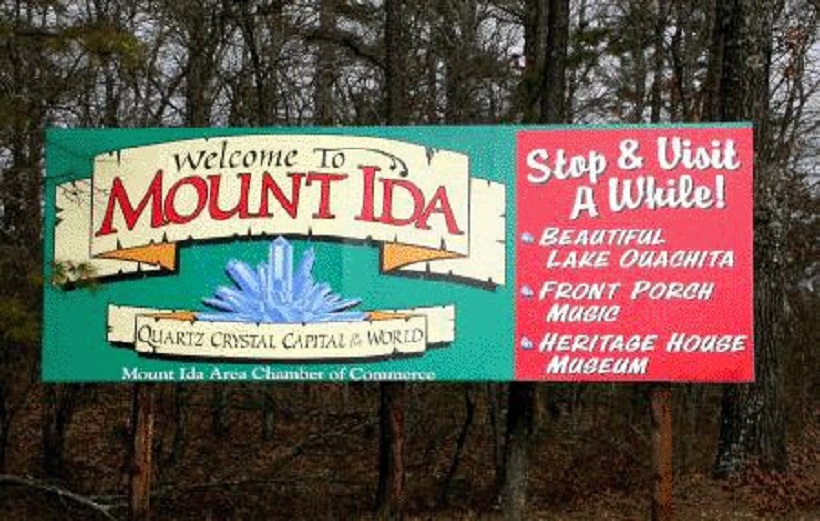
From Arkansas back to Virginia
Before we proceed backward, let's address what happened soon after the Merediths came
to Arkansas: the Civil War. One curiosity is where Mary E's family was in 1860. They
were enumerated in Montgomery County in 1850 and 1870, but not 1860. I've wondered if
it was related to the War, if maybe they went to Missouri or something and then came
back. But even though there were Union sympathizers in Montgomery, and there was some
unrest over Abraham Lincoln as a presidential candidate, I'm sure that nobody knew a
Civil War was coming before the 1860 census. What was more likely a factor was
William's wife, our ancestor, died giving birth to Mary E in 1853. He might've had to
leave to find a second wife. I know that her name was Sarah (Sallie) and she was from
Arkansas. When she became his widow, she filed for a Confederate pension in 1906.
That document says William served in the cavalry division of company Proctor from
Montgomery, so he had returned by the time the War started, if he left.
Google search turns up nothing associating the name Proctor with a Civil War
cavalry in Arkansas. But I found another widow pension application with the same
info, and it added a Monroe's regiment. This I was able to find, and I assume it was
what William served in. The other widow had been a Pettitt's wife, and she said he
signed up from Montgomery County. Though the info I have on Monroe's regiment doesn't
say it took men from Montgomery, evidently it did have at least two of them. Monroe's
served in many battles in Arkansas and Missouri and lost many men. They marched a total
of 1400 miles during the War. For the most part they avoided Union forces so as not to
be totally destroyed, and ended up hiding out in Texas. When they became aware that the
War was over, they attempted to escape to Mexico rather than surrender. When they
reached the Trinity River they decided to disband and return home, still without
formally surrendering. I've seen lots of oaths signed by former Confederates to not
take up arms anymore against the United States, but maybe those in Montgomery avoided
having to do so. I personally don't think that's a positive thing.
William's brother Duncan was in the Arkansas 4th Infantry. It was part of the Army
of the West in the Battle of Pea Ridge. 55 of them were killed there. The Arkansas 4th
ended up encamped in Tupelo Mississippi in June of 1862, where several men died of
disease or were discharged for illness. The Arkansas 4th was engaged in the Battles of
Shiloh, Richmond, and Murfreesboro. They fled the Siege of Jackson Mississippi to not
be captured by General Sherman.

Siege of Jackson Mississippi
The Arkansas 4th was consolidated into other forces, due to continual losses, and went
on to fight in the Battles of Chickamauga, Franklin, and Nashville, until they finally
surrendered at Greensboro North Carolina on April 26 1865. These battles are just a
portion of all the conflicts the Arkansas 4th saw. Once the War was over, the survivors
were given free rail transport back home. I expect that Duncan had to have been
discharged at some point, because the odds of surviving to the end weren't good, and
like his brother, he lived into the 20th century.
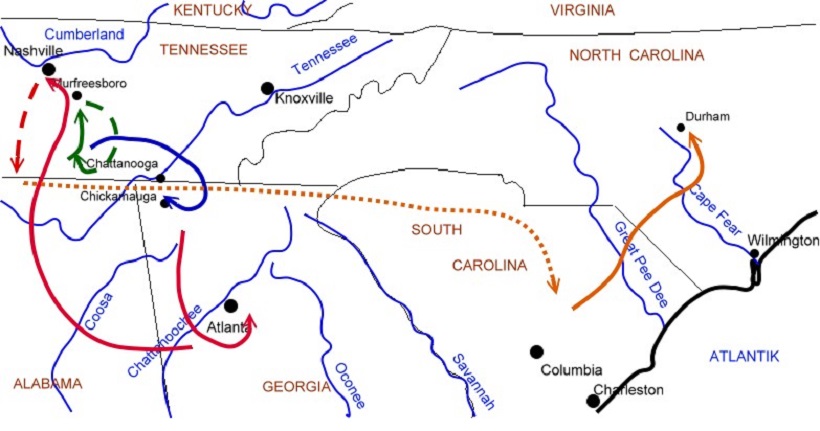
Movements of the Arkansas 4th as part of the Army of Tennessee 1862-5
We can proceed now with a single Meredith line, in Duncan and William's father John.
There was a John Meredith in Guilford County North Carolina of a similar age who wasn't
him. I don't know if this John was closely related. He was a Quaker, and I don't think
anyone in this tree was. Our John was born 1806 in Henry County Virginia. He was the
first of our line to leave Virginia and he wed 1826 in Carroll County Georgia. Henry is
very close to North Carolina, but our line never lived in the state. John brought the
line to Arkansas by 1850 after a child was born 1848 in Carroll. John's father was
William Meredith, born 1778 in Bedford County Virginia. William's father was James
Meredith, born 1747 in Goochland County Virginia. James fought for the Continental
Troops in Virginia in the Revolutionary War, in the Light Horse and Independent Company
of Foot under Captain Thomas Wade. Note that James's name was spelled Merideth in the
war rolls, setting the form the name would take in the line. I've used the standard
spelling Meredith all the way through, avoiding the macabre meaning the other form takes
in the English language. Henry is on the southern border on the Wagon Road from
Pennsylvania to the Carolinas. Bedford is farther up the Wagon Road. Goochland is
northwest of modern Richmond, where our Merediths mixed with different people than the
Scotch-Irish. I've found no evidence that our Merediths were slaveholders. Presumably
they were Anglican. They were in Arkansas for about six decades, Georgia three, and
Virginia for at least eleven. James's father was also named James, born 1747 in
Goochland. James Jr was called just Junior in some records, so it was a nickname.
From Virginia back to Wales
James Sr's father was Sampson Meredith. Sampson was born about 1680. It's not entirely
clear how the line goes backward in his time, and I'm not sure where he was born. It
could've been in Wales. In 1715 when James Sr was born, Sampson was the sheriff of
Prince George County Virginia. Sampson is said to have died about 1720, at around 40
years of age. I wonder if he died while on duty of some incident. And I wonder who
raised James Sr afterward. I've found no records about it. What is clear is the line originates
in Hugh Meredith of Radnorshire Wales. One document has a Sampson immigrating in 1711,
and another has a Sampson acquiring land in Virginia in 1687. I take both records as
accurate, that there were two Sampson Merediths who were related to each other. Both
descended from Hugh Meredith, "Huw Maredudd" who was born about 1580. A prospective line
of descent is John father of Sampson, Simon father of John, and Hugh father of Simon. I'm
not sure where the elder Sampson fits in, and I'm not sure who immigrated when.
But I am highly confident that we come from Hugh. And this brings us to the end of the
documentary trail, the point where the surname and DNA are the only remaining evidence.
Hugh's line has been tested as haplogroup I-M253. It's very odd that so many of our most
central lines were oddballs genetically. The Scotts are Middle-Eastern. The Hollises are
African. And both of our primary Welsh lines are rare. 92% of Welsh men today are of the
R-M269 haplogroup, but not our Howells and Merediths. I covered I-M253 in the Howell
document, but let's address it again here, in a moment.
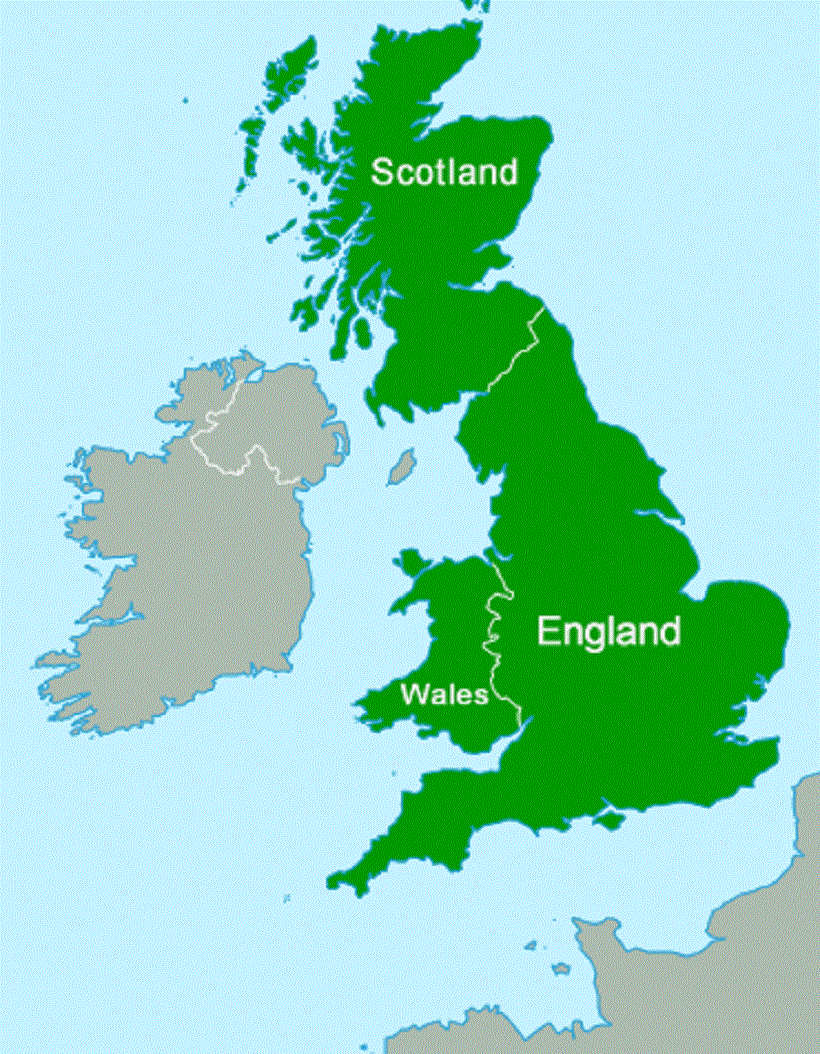
Radnorshire Wales is at the middle of the eastern edge of the country. The map above is
to orient you to the geographical position of the departure point for our line. The
Romans conquered Wales in the 1st century AD, and while people who were out at the western tip
didn't become Romanized, the people on the east side were. And you know what? Like the
Howells, our Meredith line wasn't in Britain yet. In the 1st century, our Meredith line
was actually in Scandinavia with no hint of becoming Welsh.
Northern European History
I-M253, also called I1, is known as the Germanic haplogroup. See the map below. I-M253
originated about 5000 years ago in Scandinavia. Before I realized that our Howells are
also I-M253, I didn't think the Vikings had a connection to Wales. But the Normans were
Vikings, at least genetically, and the Normans were definitely in Wales. The Howells are
from Pembroke, which was founded by Normans. The Normans built castles all over Britain,
including in Wales. The map below shows how the concentration of I-M253 reduces as you
go west in Britain. The reason for this is ruling classes don't tend to have a lot of
people. The people who spread Indo-European culture from Ireland to India had a great
impact, but it wasn't because of large populations. It wasn't because of genetics. It
was their culture, which was probably imposed for the most part. The
Vikings made settlements in Britain before the Normans came, and this was a source of
I-M253 stock there. It's clear that not a lot of Vikings settled in Normandy, though
they ruled it, and not a lot of Normans settled in Britain, or not men who descended
from the Vikings. I-M253 is also a measure of the English, as the culture was brought
by Germanic people, but the stock of people in Britain remained largely R-M269, which it
had been before even the Romans came.
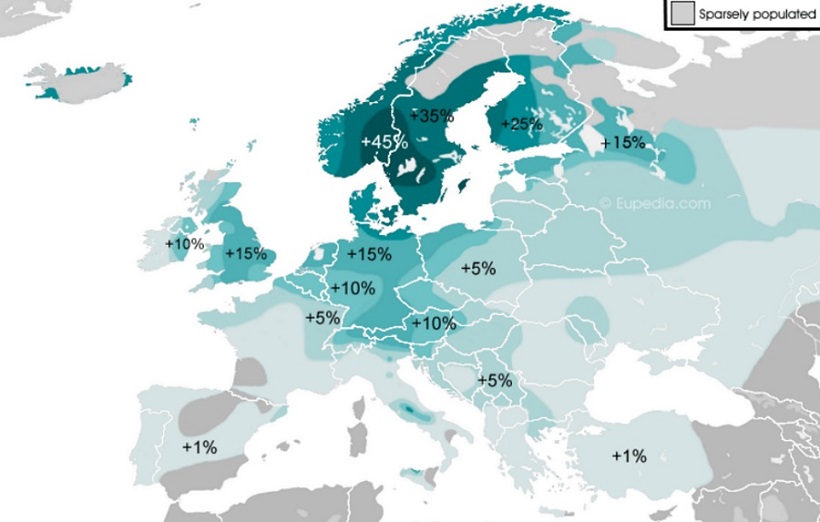
Distribution of haplogroup I-M253
It could be that our Merediths were English. If they had a similar connection to
Radnorshire that the Normans had to Pembroke, I would be as certain that the Merediths
came from Normans. But being on the border with England, the Merediths could've been
either English or Norman in origin. Whichever it was, they lived astraddle English and
Welsh culture. Now look to the map after about 800AD to put things in context. The
Kingdom of Mercia, that our Hollises were a part of, was founded by the Angles and it
came right up to the Welsh border. Recall that the eastern Welsh had been Romanized,
and they were in the middle of a gradient of formerly Celtic people that became English
on the west side. It appears that our Meredith line was likely Anglian, and they found
themselves eventually on the Welsh side of the border from their kin in Mercia.
Presumably they considered themselves Welsh and not English, having blended into the
more Celtic of the two.
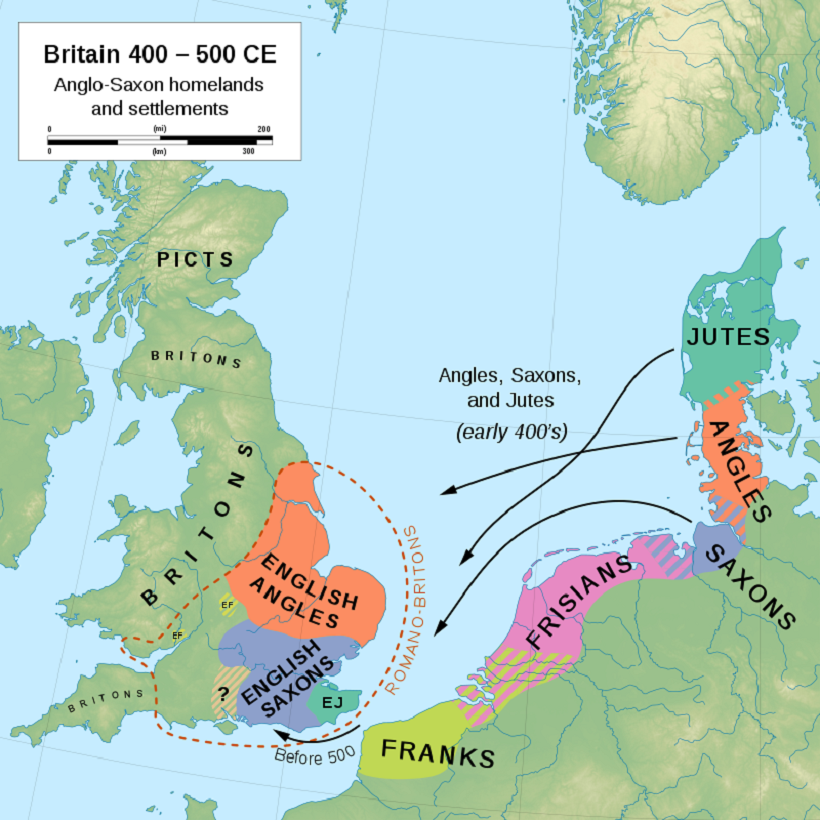
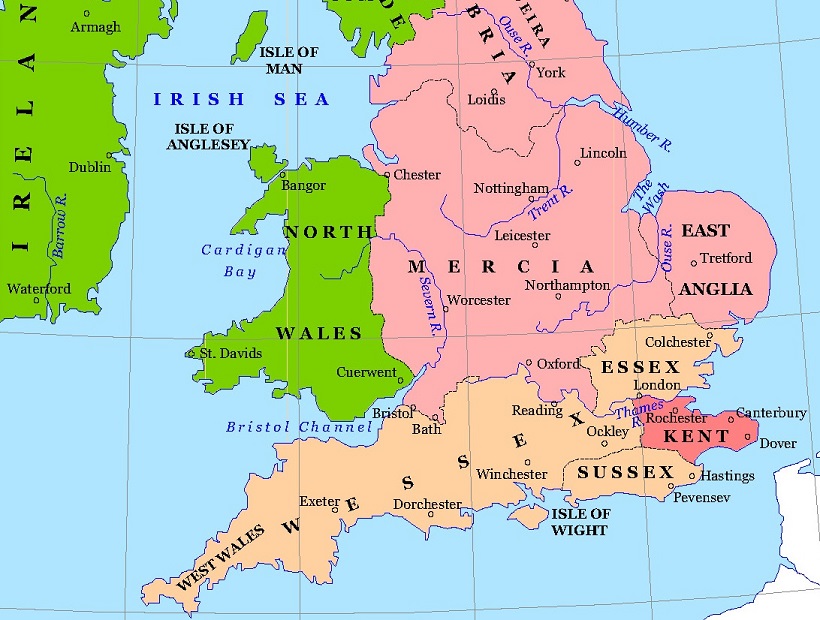
Southern Britain in 802 AD
Deeper History
So, our line was part of an invasion of Britain somewhere from the 5th century to 1066,
and they eventually become Welsh. In Wales, I-M253 is not surprisingly most dense at
the eastern-central edge of the country. That area is the region called Powys.
Surnames were only adopted in Wales in the 15th century. Prior to that, Wales had a
patronymic system of X son of Y, with no single name being carried forward multiple
generations. We don't know if the Maredudd that our line eventually adopted as their
patriarch was a prominent man. It also means that different Merediths today aren't
necessarily related. For example, Don Meredith doesn't seem to connect to us, at least
in America.
So, let's go back to the Germanic time for our line. When I-M253 emerged, ours were
probably in the area of modern Denmark and had adopted the agricultural lifestyle. But
the I-haplogroup took a different path to get to Britain than the R of our McAtees, or
the J and E of our Scotts and Hollises. I-M253 emerged from the I-M170 haplogroup.
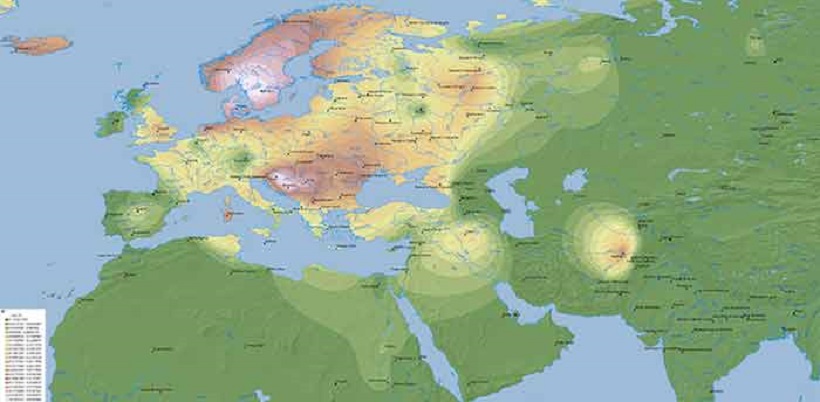
"Heat Map" of I-M170 haplogroup
I-M170 entered Europe about 30,000 years ago, foraging and hunting for their food for
over 20,000 years before other peoples introduced them to agriculture (and overwhelmed
them in numbers). I-M170 emerged originally probably in the Caucasus. See the map
below for the geographical succession of Y-DNA that defines men in the world today.
Scott and Meredith came together in our ancestors (twice), and interestingly the I and
J haplogroups were once together. The Js remained in the Middle East while the Is
moved into Europe.
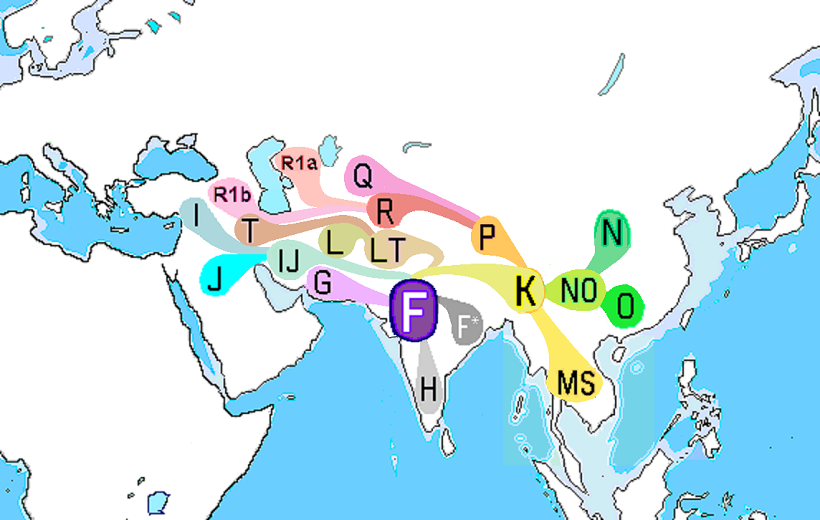
William T Meredith and Mary E Meredith's other Great-Great-Grandparent Lines
In the last phase of this document, I collect all that I know about the non-Meredith paternal lines of the great-great-grandparents of my great-great-grandfather William T Meredith and my great-great-grandmother Mary E Meredith. Refer to the Scott Pedigree page for a simple view of William and Mary's ancestors.
Newcomb
Duncan Meredith's wife was Ruthie Newcomb, born 1832 in Lawrence County Arkansas.
Lawrence is in the northeastern part of the state, near Jonesboro. Ruthie's father
was Thomas Newcomb, born 1809 in Eddyville, Caldwell Kentucky. It appears that his
mother died giving birth to him. Around the time that Ruthie was born, Thomas joined
Bean's Rangers, a cavalry unit that went to Fort Gibson in the Oklahoma Territory for
a couple of years. Their role recalls to me the Roman auxiliary units that came to
Hadrians Wall, as their purpose was to subdue the Osage who had been corralled on a
reservation there. Thomas moved the family to Montgomery County after the 1850
census was taken. Ruthie wed there in 1851. In the Civil War, it looks like the
Newcomb family was split, with brothers of Ruthie fighting on both sides.
Thomas's father was also named Thomas, born 1785 in Rockingham County North Carolina.
He moved to the Nashville Tennessee area to be wed in 1807, and then moved to Kentucky.
Thomas Sr's father was called "Irish Joe" Newcomb. Joe was born in 1767. It's been
presumed, with that name, that he was born in Ireland. Some have claimed that he was
born in Scotland, and some in England. I'm certain that he didn't immigrate as an
adult, because Thomas Sr was born when Joe was 18 years old, leaving no time to move
and get married and so forth. I don't know anything
about Joe's mother, but I would guess that Joe immigrated as a child. I would guess
that he was born in America, save for his nickname. It was unusual for my ancestors
to immigrate with family, but it did happen, and maybe more with Irish families. That
said, I speak of Joe's father but I don't know his identity.
From what I've seen, Newcomb is
totally English, and pre-Norman, from Lincolnshire. I can only assume the Newcombs
have been assumed to be Scots-Irish. What does seem clear is they came from Ireland.
But there certainly were English families there. This looks like a rare case
amongst my ancestors of an Anglo-Irish line. What that says to me is the English
who were there had a much better time than the Scots, to not be driven as much to
emigrate again, to America. Certainly, without evidence, I wouldn't assume this was
a Scottish family. Joe is said to have immigrated from Londonderry. He was known to
be Protestant, and I would assume Anglican. Researchers claim he went straight to
North Carolina, and not through Virginia. The Newcombs were not slaveholders. I've
not found any lead on Newcomb Y-DNA, so I have to assume it was the R-M269 haplogroup.
McBurnett
Phoebe McBurnett was Mary E Meredith's mother, born 1830 in Carroll County Georgia.
Phoebe wed 1847 in Carroll before coming to Montgomery County Arkansas. She died in
1853, evidently giving birth to Mary. Phoebe's father was Nicholas McBurnett, born
1805 in Clarke County Georgia. He wed in Newton County and raised his family in
Carroll. Athens Georgia is in Clarke. Newton is southeast of Atlanta. Carroll is
on the Alabama border. Nicholas's father James was born in 1774. Previous research
places this in Georgia, but I'm sure he came from the Carolinas. The second of three
known tragedies in the McBurnett line was that James was killed 1813 in Jasper County
Georgia. He was a private in Alexander's battalion riflemen in the Georgia militia.
James's father was Daniel McBurnett, born in 1750. Previous research also places his
birth in Georgia, which I'm completely certain is wrong. The line came to Georgia
in 1790, which is actually very early.
Daniel fought in the Battle of Kettle Creek in the Revolutionary War. This was in
Wilkes County Georgia, which I think is why other researchers have placed the line in
the state so early. But the soldiers who fought in it were from the Carolinas. The
first counties in Georgia were formed in 1777. I presume our line came through the
Carolinas, and that it originally immigrated to Pennsylvania, I'm going to assume that
it followed a similar path to Andrew Pickens, who was a leader in the battle.
Therefore I place James's birth in Abbeville County South Carolina, and Daniel's in
Bucks County Pennsylvania. The third known tragedy in the McBurnett line happened to
Daniel. He'd started an enterprise of guiding wagon trains to Florida. He was killed
in 1793 on one such trip, in Camden County Georgia which is just north of Jacksonville.
Daniel's father was Nicholas McBurnett, born in 1730. Information on the line is
sketchy at best before 1790, but it seems that Nicholas was born in Scotland.
Houseofnames.com doesn't even have a page for McBurnett. Other sources claim that
Burnett means "little brown-haired one", but that probably was distorted from
McBurney. Burnett is a known surname, and what I expect happened was English people
who were familiar with it transformed McBurney into McBurnett. McBurney is a highland
name from the Hebrides, tracing back to Dal Riata. The McBurnetts were not slaveholders.
I presume they were Presbyterian. McBurneys were Y-DNA haplogroup R-M269.
Whisenhunt
Duncan and William Meredith's mother was Elizabeth Whisenhunt, born 1806 in Randolph
County North Carolina. Her father was Adam Whisenhunt, born 1769 in Lincoln County
North Carolina. Adam brought the line to Carroll County Georgia. Adam's father was
George Whisenhunt, born 1734 in Muddy Creek, Lancaster County Pennsylvania. George's father
was Adam Visenandt, born 1719 in Edenkoben, of the Baden state of what would become
Germany a century and a half later. Adam's father was Philip Visenandt, born 1684 in
Edenkoben, which is southwest of Heidelberg. Philip's father was Franz Visinand,
born 1645 in Vaud, of the Bern Canton of Switzerland. The line traces back more
generations in Vaud, on the north shore of Lake Geneva. It looks like the Visinands
were similar to the Hirtzels, where Franz's father was a Lutheran pastor and was summoned
to Baden in the wake of the 30 Years War. Franz became a winemaker at Heilsbruck,
which had been a Cistercian monastery. The Whisenhunts were not slaveholders. The
Whisenhunts were of the Y-DNA haplogroup I-M253. They probably migrated south from
the Denmark area, in the wake of the fall of the Roman Empire. They could've even
been 'barbarians' knocking at the Roman gates. It's quite ironic that the Merediths
came together with the Whisenhunts in Georgia, as both were I-M253 lines that took
very different paths.

Markham
Ruthie Newcomb's mother was Lydia Markham, born 1811 in Caldwell County Kentucky.
The Markhams evidently were very much on the move as Lydia and her siblings were
born. They arrived by 1825 where Randolph County Arkansas would be formed, north of
where Ruthie raised her own family. That sister of Lydia wed a Collier man of a
line that was said to be in the Mt Ida area from 1812, when it was part of the
Missouri Territory. Collier lore says the Markhams came to Montgomery County from
Illinois. I used to think this was nonsense, but there is a claim of a sibling of
Lydia being born in Illinois. The fact is the southern tip of Illinois isn't
that far from Arkansas. Take a look at the map below. Myrtle Meredith was buried
in Metropolis Illinois. Lydia was born in Caldwell Kentucky in 1811. Her sibling
born in Illinois was in 1820. They were in Arkansas by 1825.

Lydia's father was Thomas, born 1790 in Bedford County Virginia. I don't have a
wedding document for Thomas, but he obviously went through Tennessee to get from
Bedford Virginia to Kentucky, and his wife was from South Carolina. I would guess
they wed in Nashville, the same as Lydia's husband's family. Thomas's father's
name was also Thomas, born 1757 in Prince Edward County Virginia. Sr was in the
Virginia Line in the Revolutionary War. A Colonel of his unit was a Meredith.
They were stationed at Hampton to prevent the British landing there. Thomas Sr's
father was Arthur Markham, born 1730 in Henrico County Virginia. Arthur's father
was also named Arthur, born 1700 in New Kent County Virginia. Arthur Sr's father
was Thomas Markham, born 1682 in Bingham, Nottinghamshire England. The Markhams
were considerable slaveholders. Presumably they were Anglican. The Markhams
have been tested as Y-DNA haplogroup R-M269. The name comes from the Markham
parish in Nottinghamshire.
Adams
Phoebe McBurnett's mother was Lucinda Adams, born 1814 in the Pendleton District of South Carolina, where Anderson County would be formed. Lucinda's father was George Adams, born 1790 in Pendleton. George's father was James Adams, born 1763 in the Camden District of South Carolina, where Lancaster County would be formed in 1785. Camden wasn't actually formed until 1768. This seems to have been a relatively well-off family, yet I've found no evidence of slaveholding. James's father was also named James, born 1733 in Stafford County Virginia. James Sr's father was David Adams, born 1705 in Stafford. David's father was James Adams, born 1680 in Stafford. James's father was Francis Adams, born 1645 in Northumberland County Virginia. There was no move between counties; rather Stafford was formed from what had been Northumberland. Westmoreland was formed between. Francis's father was William Adams, born 1618 in Oxford England. Adams seems to be a Welsh surname, and descendants have been tested as Y-DNA haplogroup R-M269.
Heard
John Meredith's mother was Rosie Heard, born 1782 in Henry County Virginia. She died at age 27, presumably in childbirth. Rosie's father was William Heard III (at least), born 1755 in Halifax County Virginia, where Pittsylvania County would be formed. William II was born 1735 in Virginia. I don't know exactly where, so the best guess is where the Merediths were at that time, Goochland County. William I was born 1715 in County Tyrone Ireland. Heard seems to be an English name from Shropshire, properly spelled Herd for animal herder. The surname Hurt sounds similar but has a different origin. This is a second Anglo-Irish line in this tree, which I've not seen at all elsewhere. I've seen no evidence of slaveholding in this line, but it's very early. Presumably they were Anglican. The Heard DNA project is a split between R-M269 and E-M35. I see no connection to our line there. Given the small sample size, I assume there would be more R-M269 and thus that has to be the guess for our line.
Biffle
When I first built my family tree on ancestry.com, Adam Whisenhunt's wife was
"Barbery Bell". It wasn't clear if Bell was her maiden name, or maybe was
supposed to be a nickname Belle. A picture of her was uploaded by someone, which
was something for someone who died in 1870. Now that I think on that, the woman
in the photo looked about 30 years old, and photography didn't exist in 1800, not
anywhere in the world let alone North Carolina. I've seen lots of photos all
over my tree that are attributed to people that just couldn't be possible. I
don't know how it keeps happening. But getting back to Barbery, the woman in the
photograph doesn't look like a typical British person. I saw claims that she was
Cherokee.
For a long time she remained a mystery, until someone recently figured out that
her maiden name was Biffle. It was obvious that her paternal line was German, so
it fits. Maybe the problem was solved using ThruLines. If it hadn't been solved,
I may have been able to, if information for her father was out there. His name
was Martin Biffle, born 1738 in Pennsylvania. Martin's father was Paul, or Johan
Paulus Beuffle (in place of eu is the umlaut u, pronounced like beefle, is German
for buffalo), born 1699 in Contwig, Baden. This is between Karlsruhe and Luxembourg
on the French border. They were Calvinist. I expect they weren't slaveholders, but
the line is very early. There's no info on Y-DNA, so haplogroup R-M269 has to be assumed.
Tennison
Ruthie Newcomb's paternal grandmother was Mary Tennison, born in 1766. This line is so uncertain that it's not clear where Mary was born. Her father Thomas certainly was born 1727 in England, specifically in Burstwick Yorkshire. ThruLines support Mary and her parents as being ancestors. But it's uncertain where they died. It's possible that they never left England, but I would guess that at least her father did, which I will get to. I think what obscures Mary's origin the most is she was 19 years older than her husband who was our ancestor, Thomas Newcomb Sr. That has to mean that she was a widow. But I've found no information on it. And though there's question whether she was born in England, she wed Thomas Newcomb in the Nashville Tennessee area. That would be quite a westward move. I therefore assume that Mary was probably born in North Carolina. Without evidence, I would assume it was in Rockingham County so that her family was acquainted with the Newcombs. The typical assumptions have to be made about the line's religion and Y-DNA. The name has the same origin as Dennison, meaning son of Dennis. Geni.com traces our line back to the 15th century in Yorkshire, where it was spelled Tennysone.
Brakefield
Ruthie Newcomb's maternal grandmother was Lydia Brakefield, born 1785 in Chester County South Carolina. Lydia's father was Christopher Brechbiel, born 1748 in New Hanover, Montgomery County Pennsylvania. Christopher's father was Isaac Brechbiel, born 1721 in the Bern Canton of Switzerland. Isaac's father was Abraham Brachbuhl. I know nothing else about this line, other than there's a little hotel (I guess) northeast of Bern called Brachbuhl Marie Huus, where the a and u have umlauts. Presumably this was a Lutheran family. Google search actually does turn up Brakefield Y-DNA under another surname project, and it is haplogroup R-M269.
Pate
Phoebe McBurnett's paternal grandmother was Nancy Pate, born 1778 in Blacksburg,
Montgomery County Virginia. Her father was Jacob Pate, born 1755 in Blacksburg,
which was in Augusta County at the time. He was still in Virginia when the
Revolutionary War began, as he served in the Virginia militia. Nancy wed in
Clarke County Georgia about 1800, and it's uncertain what happened before then
in her life. Jacob is believed to have died in Tennessee, but it's easy to
conflate him with other Jacob Pates. Nancy's husband was born in Georgia, so
Jacob must've taken the family there by 1800. It's possible that they lived
somewhere in the Carolinas between. Nancy claimed birth in both of them. In my
experience, a lack of records in this time was due to living in far-eastern
Tennessee. I would guess that Jacob moved there before 1790, when it was part
of North Carolina. James McBurnett very well may have met Nancy there, rather
than the family living in Georgia.
Jacob's father was Jeremiah Pate, born 1732 in Gloucester County Virginia.
Jeremiah's father was Anthony Pate, born 1702 in Gloucester. Anthony's father
was John, born 1677 in Gloucester. John's father was Thomas, born 1636 in
Leicestershire England. Geni traces the line back to the 14th century, so they
evidently were well-off. The name comes from the parish of Pattishall in
Northamptonshire. I'm not sure how the name was truncated down to Pate. That
name has an origin in the name Patrick. Presumably our line was Anglican. It
looks like our line is Y-DNA haplogroup R-M269. There's no indication that this
line were slaveholders.
Hearne
Phoebe McBurnett's maternal grandmother was Martha Hearne, born 1792 in Pendleton South Carolina. Martha's father was John Hearne, born 1760 in Anson County North Carolina, in the area that would become Montgomery County. John's father was Thomas Hearne, born 1720 in Somerset County Maryland. Thomas's father was also named Thomas, born 1691 in Somerset. Thomas Sr's father was William Hearne, born 1630 in London England. The path of this line to Maryland is uncertain, as a book published on Hearne genealogy in 1907 shapes the beliefs of previous researchers. It seems obviously riddled with errors to me, thus I believe in the Maryland path. The break is at Thomas Jr, who seems to have lived his entire life in Virginia, while John was born in North Carolina. Thomas from Maryland died in North Carolina. ThruLines don't help to prove which path is accurate. Regardless, both paths come from William of London. Presumably the line was Anglican. There's no evidence of slaveholding in this line. DNA researchers consider the name Hearne to be equivalent to Herron, which came to England with the Normans. Descendants have been tested as Y-DNA haplogroup R-M269.
Crews
James Junior Meredith's wife was Polly Crews, born 1752 in Halifax County Virginia.
Her father was Hardiman Crews, born 1735 in Hanover, Goochland County Virginia.
Hardiman's father was Edward Crews, born 1714. Edward's father was Arthur Crews,
born 1673. Existing research has Edward's birth place as Northampton County Virginia
and Arthur's as New Kent County. This appears to be geographically backward.
Arthur's father was Andrew Crews, born in England, probably around 1640. The name
Crews comes from the township of Crewe in Cheshire. Evidently the forms Cruse and
Cruise have the same origin. Presumably ours were Anglican. The line is way too
early to have evidence of slaveholding. Apparently ours were of Y-DNA haplogroup
I-M253 like the Merediths, which likely means they were Normans. Houseofnames.com
says the name is pre-Norman. If that's the case, ours didn't name the town, and
adopted the name because of living there.
Info on this line is sketchy. But there are claims associated with it that seem way
too specific to me to be wrong. Polly is said to have been half-Cherokee, and her
mother was Phoebe Ajosta Gooche, who's said to have been a legitimate Cherokee. I
would guess that generations are being skipped, because Polly was born in Virginia,
and Cherokee ancestry would've come from the Carolinas or Tennessee or Georgia. It
seems that a 100% Cherokee ancestor as my seventh great grandmother would show up
in my, and certainly my dad's, autosomal DNA. I haven't attempted to prove any of
this, but ancestry.com has Phoebe born 1740 in North Carolina, with parents
Anakwaanki Skayagustueywo and Tame Doe Attakulkulla, and grandparents Taminad
Fivekiller, Que Disi Tellico, Amatoya Amadohiyi Moytoy, and Quatsi Tellico.
On top of this, James Meredith's grandfather was Thomas Lassiter, whose mother is
said to have been of the Nottoway tribe in Virginia, called Prudence Cheroenhaka.
The Nottoway were similar to the Powhatan, yet they never merged with them and
remained in one location. It appears that their survival, though they were never
large in numbers, was aided by their location being swampland that European settlers
avoided.
Hickey
Rosie Heard's mother was Jane Hickey, born 1765 in Pittsylvania County Virginia. Jane's father's name was John, and he's said to have operated a general store in Henry County that a 24-year-old George Washington visited and purchased items, which was recorded in his own journal. I know nothing else about John. Hickey is said to be a native Irish surname from County Clare. Presumably John was born there. This is a very odd line in the Meredith tree. I would guess that somehow they were Anglican, living in Virginia in the 18th century. Almost all Hickeys who have been tested are Y-DNA haplogroup R-M269.
Carmon
Adam Whisenhunt the younger's mother was Eve Carmon, born 1747 in Rowan County North Carolina. Eve's father was John Carmon, born in 1709. I know nothing else about this line, but Carmon is a French name related to Carmen. As this line wed into a German family, presumably these were Lutherans from the Alsace region. Carmon also came to England via the Normans. There is no Carmon/Carmen/Carman DNA project, so I have to guess they were of Y-DNA haplogroup R-M269.
Rothgeb
Barbery Biffle's mother was also named Barbery. She was born 1737 in Mill Creek, Orange County Virginia. Her maiden name is a curiosity. I've seen it written Rothgeb, Rodecap, and Radtgab. Rodecap is how it was written in documents in America, so it must've been pronounced similarly. Rothgeb is the spelling I choose, because I've seen the name in Swiss documents, with an umlaut on the o. Importantly, I do know that Barbery's father was Hans Jacob Rothgeb, born 1708 in Wallisellen, of the Zurich canton of Switzerland. Presumably they were Lutheran. The name doesn't look German or French to me, so maybe it came from some point to the east of Switzerland. I've had little luck learning anything more from Google search. I have to guess they were of Y-DNA haplogroup R-M269.
Dudley
Irish Joe Newcomb's wife was Esther Dudley, born 1769 in Rockingham County North Carolina. I don't know how Esther connects, but the patriarch of the line was William Dudley born 1625 in Bristol England. He immigrated to Virginia, but I don't know where. The line is associated with Amherst County. The surname Dudley comes from the town of Dudley in Worcestershire. It's said to predate the Normans. Presumably, they were Anglican. It looks like our line was of Y-DNA haplogroup R-M269.
Smith
Mary Tennison's mother was Jane Smith, born 1727 in Sundridge, Kent England. Part of what makes Mary difficult to track is that info for Jane has her living all her life in England. The prospective line from Jane is Robert Smith born 1702 in Bedfordshire and Thomas Smith born 1660 in Bedfordshire. Presumably they were Anglican. The name is entirely too common and old to know its Y-DNA. I therefore have to assume they were part of haplogroup R-M269.
Wilkinson
Lydia Markham's paternal grandmother was Nelly Wilkinson, born 1764 in Bedford County Virginia. Nelly's father was Joseph Wilkinson, born 1729 in Powhatan County Virginia. Joseph's father was Nicholas Wilkinson, born 1707 in Powhatan. Nicholas's father was John Wilkinson, born 1675 in Charles City County Virginia. John's father was also named John, born 1640 in Charles City. John Sr's father was Thomas Wilkinson, born 1612 in Tetbury, Gloucestershire England. I don't know anything else specific about this line, but it brings to mind Jane Wilkinson, also known as Jane Long the "Mother of Texas". We don't descend from her, but the McAtees married into her family. That said, her line was from Maryland and not Virginia, so if they were related it was before immigration. The Maryland Wilkinsons were probably Catholic too, and ours were Anglican. The name Wilkinson is of Viking origin, probably by settlers in England and not the Normans. Some documents/researchers have the name as Wilkerson, but as far as I know that name isn't related. The Wilkinson DNA project is one that isn't public. Given that the name is Norse, I'll assume it's I-M253.
Lindsey
Lydia Brakefield's mother was Mary Lindsey, born 1733 in Augusta County Virginia. This line is utterly unclear, especially since Mary wed into a Swiss Lutheran line that was on the way from Pennsylvania to South Carolina. Ultimately the Lindsey name originates in the town of Lindsay in Northumberland England. This doesn't seem to exist anymore, but I think it was on the eastern end of the border with Scotland. It seems most likely to have come to America via Scotland or Scotland via Ireland to America. Given the Pennsylvania connection to Mary's husband, this makes sense. I'm going to assume a direct connection from Northumberland to Augusta without any other info. I presume the line was Presbyterian. There are a lot of I-haplogroup Lindsey/Lindsays, but I have to guess that ours was R-M269.
Wadsworth
James McBurnett's mother was Esther Wadsworth, born 1751 in North Carolina. The best lead on Esther's father that I have is an Edward born 1700 in Pasquotank County North Carolina. But I don't know who Edward's father was. Wadsworth is an English surname from the town of Wadsworth in Yorkshire. It's said to have been anglicized from the original Norman Wadsuuorde, where suuorde means 'south'. Our Wadsworth Y-DNA is likely to be from haplogroup R-M269.
Fry
Nancy Pate's mother was Fanny Fry, born 1758 in Virginia. I don't know who her father was. The surname Fry is related to Frey, which either went to England with the Normans or came to America from mainland Europe. Given the family our Frys married into, and being in Virginia, my guess is the line was Norman and immigrated from England. Fry/Frey/Frye who've been tested for Y-DNA have shown very little I-M253, so if they were Norman they were regular French and R-M269.
Reid
George Adams's mother was Anne Reid, born 1765 in Caswell County North Carolina. Anne's father was Nathaniel, born 1736 in Inverness Scotland. I have the line going back two more generations in Inverness. Nathaniel was a captain in the Revolutionary War. Reid is very likely to come from Y-DNA haplogroup R-M269. I presume this line was Presbyterian. Inverness is in the Scottish highlands.
Chesney
Martha Hearne's mother was Annie Chesney, born 1765 in Dunclug, Antrim Ireland. Annie's father was Robert McChesney, also from Antrim. I don't know actually where the 'Mc' came from, unless there was a similar Irish surname. But Chesney is said to be Norman, from a French origin. Probably the Chesneys were another Anglo-Irish line in the Meredith trees. It's not clear at all what haplogroup the Chesney line was, but as usual R-M269 is the best guess.
Summary of William T Meredith and Mary E Meredith's Great-Great-Grandparent Lines
Given that two of my great-great-grandparents were Merediths, I've combined them
here into one document. In order for all of the summaries to carry the same
weight, this one contains 32 lines, with the Meredith halves counted twice each.
Only one of the 32 lines were known slaveholders. Surely a few more were, and
were too early to leave records, but I wouldn't expect more than 20%. The
combined Meredith trees were about half English, with three Welsh including the
Merediths themselves, and a quarter from mainland Europe. These trees are the
most predominantly R-M269 Y-DNA haplogroup that I've seen, more than three
quarters, but quite a few are total guesses. Almost an eighth were of the I-M253
Viking haplogroup, including the Merediths. Only the I-M253 Y-DNA came down to
us, but the others do help in understanding where our Meredith ancestors came
from. Two thirds of the lines were Anglican or presumed Anglican, a few
Presbyterian, and a quarter were mainland Europe Protestant sects.
Migration paths
Meredith: 1850 Gap, Montgomery, Arkansas - 1826 Carrollton, Carroll, Georgia - 1800 Martinsville, Henry, Virginia -
1770 Bedford, Bedford, Virginia - 1740 Goochland, Goochland, Virginia - 1710 New Kent, New Kent, Virginia -
1680 Lancaster, Lancaster, Virginia - 1100 Old Radnor, Radnorshire, Wales
Newcomb: 1850 Gap, Montgomery, Arkansas - 1832 Walnut Ridge, Lawrence, Arkansas - 1800 Eddyville, Caldwell, Kentucky -
1799 Nashville, Davidson, Tennessee - 1785 Eden, Rockingham, North Carolina - 1610 Londonderry, Derry, Ireland -
0 Lincoln, Lincolnshire, England
McBurnett: 1850 Gap, Montgomery, Arkansas - 1826 Carrollton, Carroll, Georgia - 1790 Athens, Clarke, Georgia -
1770 Abbeville, Abbeville, South Carolina - 1750 Newtown, Bucks, Pennsylvania - 0 Sanday, Hebrides, Scotland
Whisenhunt: 1825 Carrollton, Carrol, Georgia - 1790 Asheboro, Randolph, North Carolina - 1760 Salisbury, Rowan, North Carolina -
1731 Muddy Creek, Lancaster, Pennsylvania - 1682 Edenkoben, Rhineland, Baden - 700 Vaud, Bern, Switzerland -
0 Aalborg, Denmark
Markham: 1825 Pocahontas, Randolph, Arkansas - 1815 Metropolis, Massac, Illinois - 1810 Eddyville, Caldwell, Kentucky -
1785 Bedford, Bedford, Virginia - 1750 Farmville, Prince Edward, Virginia - 1720 Varina, Henrico, Virginia -
1700 New Kent, New Kent, Virginia - 1600 Bingham, Nottinghamshire, England - 0 Markham, Nottinghamshire, England
Adams: 1825 Oxford, Newton, Georgia - 1785 Anderson, Pendleton, South Carolina - 1760 Lancaster, Camden, South Carolina -
1640 Falmouth, Northumberland, Virginia - 1600 Oxford, Oxfordshire, England
Heard: 1780 Martinsville, Henry, Virginia - 1735 Goochland, Goochland, Virginia - 1600 Tyrone, Tyrone, Ireland -
0 Nesscliffe, Shropshire, England
Biffle: 1753 Salisbury, Rowan, North Carolina - 1738 Lancaster, Lancaster, Pennsylvania - 0 Contwig, Rhineland, Baden
Tennison: 1808 Nashville, Davidson, Tennessee - 1760 Eden, Rockingham, North Carolina - 0 Burstwick, Yorkshire, England
Brakefield: 1785 Chester, Chester, South Carolina - 1770 New Castle, Craig, Virginia - 1745 New Hanover, Montgomery, Pennsylvania -
0 Langnau Im Emmental, Bern, Switzerland
Pate: 1800 Carrollton, Carroll, Georgia - 1785 Jonesborough, Washington, North Carolina - 1750 Blacksburg, Augusta, Virginia -
1670 Petsworth, Gloucester, Virginia - 1600 Leicester, Leicestershire, England - 0 Pattishall, Northamptonshire, England
Hearne: 1780 Pendleton, Pendleton, South Carolina - 1760 Wadesboro, Anson, North Carolina - 1670 Princess Anne, Somerset, Maryland -
1600 London, London, Englands
Crews: 1750 Halifax, Halifax, Virginia - 1735 Hanover, Goochland, Virginia - 1700 New Kent, New Kent, Virginia -
1670 Cheriton, Northampton, Virginia - 0 Crewe, Cheshire, England
Hickey: 1760 Chatham, Pittsylvania, Virginia - 0 Ennis, Clare, Ireland
Carmon: 1740 Salisbury, Rowan, North Carolina - 0 Metz, Alsace, France
Rothgeb: 1730 Mill Creek, Orange, Virginia - 0 Wallisellen, Zurich, Switzerland
Dudley: 1765 Eden, Rockingham, North Carolina - 1750 Amherst, Amherst, Virginia - 0 Dudley, Worcestershire, England
Smith: 1720 Sundridge, Kent, England - 0 Bedford, Bedfordshire, England
Wilkinson: 1760 Bedford, Bedford, Virginia - 1700 Powhatan, Powhatan, Virginia - 1640 Charles City, Charles City, Virginia -
0 Tetbury, Gloucestershire, England
Lindsey: 1730 Staunton, Augusta, Virginia - 0 Lindsay, Northumberland, England
Wadsworth: 1720 Elizabeth City, Pasquotank, North Carolina - 0 Wadsworth, Yorkshire, England
Reid: 1765 Yanceyville, Caswell, North Carolina - 0 Inverness, Inverness, Scotland
last edited 17 Aug 2022
